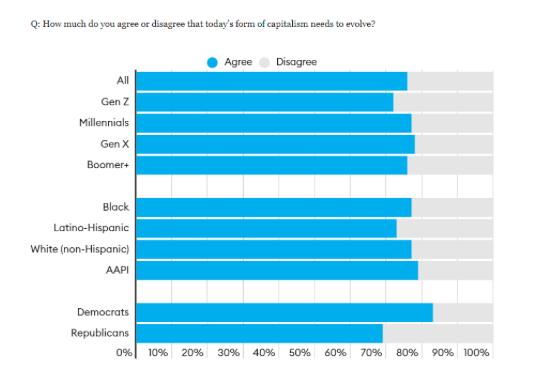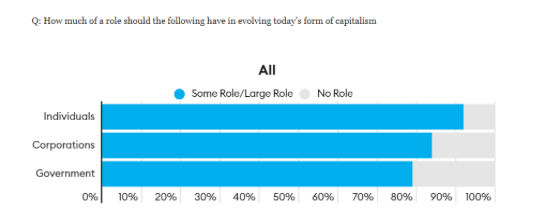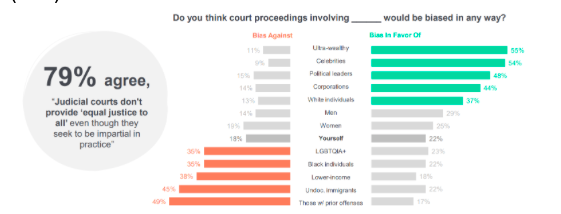Brief • 5 min Read
Reports show inflation easing, but there’s little cooling of concern about the economy and inflation. For example, in our America, This Week survey, fielded from May 5th to May 7th among 2,102 Americans, inflation worries (86%) of Americans (+1%-pt since the end of March) followed by crime (82%, 0%-pt). But there is less public anxiety about the solvency of U.S. banks (67%, -2%-pts) and the security of investor deposits in financial institutions (61%, -4%-pts).
Four new polls this week include the growing perceptual problems with capitalism. Also, we find that more employers and their employees are further apart in their feelings about work and life. Another fascinating stat shows that most Americans believe that A.I. judges could be better than humans. Lastly, patients underreport their mental health vs. what their health providers see.
You can download the new ATW monthly summary tabs and deck here.
Capitalism’s Crisis of Perception: Forbes-Harris Poll
While no economic system has lifted more people out of poverty, solved more of life’s ills, and created more innovation, opportunity, and socio-cultural benefit than capitalism––the system remains imperfect. And today, with growing inequality and generational shifts, many more Americans are critical of its comparative good, according to our latest poll with Forbes.
- Most Americans think capitalism needs to evolve: Across age, gender, race, ethnicity, and even political affiliation, almost (80%) of Americans think capitalism needs to become:

- Younger Americans interested in socialism: Over half of younger Americans would be willing to trade today’s form of capitalism for socialism (Gen Z: 55%, Millennials: 65% v. Gen X: 43%, Boomer+: 27%).
- Despite doubts, more Americans think that capitalism is the best option compared to other market types to foster the ability to accumulate wealth (70%), start a business (68%), and secure a well-paying job (62%). However, Gen Z needs more convincing (52%, 47%, and 37%).
- Americans think capitalism’s evolution requires people, businesses, and government to all play a role, where over half (57%) would be willing to pay more for goods and services to guarantee living wages for workers.

Takeaway: Building a better future and an evolved and more perfect form of capitalism will take all of us. “Capitalism is not a static economic model. Instead, it adapts and evolves with the times,” says Harris Poll CSO Libby Rodney. “It’s clear in the data that Americans want an evolution of capitalism that enables better access to their foundational needs of livable wages, affordable housing, and healthcare.”
The Employer-Employee Breakdown: Transamerica Institute-Harris Poll
If you feel more disconnected from your boss, you’re not alone. According to our latest report with the Transamerica Institute, employers feel responsible for their employees; however, apparent employer-employee disconnects need attention.
- More than nine in ten employers (96%) believe they help support their employees’ work-life balance, but (75%) of employees believe this.
- And most employers (85%) are concerned about their employee’s mental health, as are most workers (61%). Yet only one-third of employers (33%) offer an employee assistance program (EAP).
- Cultivating an age-friendly work environment: (83%) of employers consider themselves age-friendly, compared with just two-thirds (67%) of employees.
Takeaway: “Employers are grappling with workforce issues ranging from attracting and retaining talent to productivity, flexibility, and return-to-work policies. Many are reevaluating their business practices and benefit offerings in today’s rapidly evolving environment. Still, the question is whether they are in sync with employees’ needs,” said Catherine Collinson, CEO and president of Transamerica Institute and TCRS.
With Human Bias on Trial, A.I. Wins
Justice is blind, the saying goes, but nearly half of Americans don’t believe this. If they were in court, most would prefer an A.I. judge to a human one, according to the latest research from The Harris Poll Thought Leadership and Futures Practice (as featured in the latest Harris Poll substack: The Next Big Think!).
- The winners and losers of the current system: Eight in ten Americans (79%) believe the court system is biased and provides unequal justice, with majorities saying courts give special treatment to the ultra-wealthy (55%), celebrities (54%), and political leaders (48%), while being biased against those with prior offenses (49%), undocumented immigrants (45%), and Black Americans (35%):

- Many Americans would welcome A.I. into the courtroom: (45%) believe an A.I. judge would be more likely to provide a fair sentence.
- In fact, (43%) say, “I would prefer an A.I. judge rather than a human one in a potential court hearing.”
- And a majority agreed that A.I. could provide a variety of benefits, including preventing long waits for court hearings (62%), countering human error and bias (60%), and providing more equitable sentences (59%).
Takeaway: “We were surprised to learn over half of Americans think A.I. judges would be more equitable in sentencing, but when you take into consideration the doubts around the impartiality of our judicial system, it starts to add up,” said Libby Rodney, Chief Strategy Officer at The Harris Poll. However, Rodney cautioned that the perceived impartiality of A.I. is somewhat of an illusion: “It’s crucial to note A.I. is not necessarily neutral, as it reflects the values and biases of its creators. Essentially, ‘people programming’ codifies our belief systems into a machine that reflects our values back to us.”
The Mental Health Perception Gap: CVS Health-Harris Poll
You know an issue needs attention when it has a designated month. For example, May is Mental Health Awareness Month, and Harris and CVS Health bring attention to growing disparities in awareness and care in HealthLeaders Media.
- Gen Z’s mental health concerns are higher than the national average: While (42%) of Americans express concerns about their mental health, that number swells to (60%) of younger Americans aged 18-32.
- Physicians report more significant declines in patients’ mental health: While only (14%) of Americans say their mental health has declined since 2022, (56%) of physicians beliepatients’patients’ mental health has deteriorated.
- Worried for others but not seeking self-help? Two-thirds (67%) say they knew many people with mental health struggles. But only (12%) regularly see a mental health professional themselves.
Takeaway: The reasons for the disconnects – between providers and patients, patients and “other people” – are likely varied but perhaps not as unexpected as they seem. “Often we assume that people they’re thinking and feeling…We have been feeling the impacts of COVID, of pandemic socialization over the past three years. We’re perhaps even immune to it. But physicians continue to see the impact and disruption when patients come in to see them and for reasons other than mental” health,” says Cara McNulty, DPA and CVS Health president of Mental Well-Being & Behavior Health.
Subscribe for more Insights
Subscribe to our newsletter for the latest trends in business, politics, culture, and more.
Download the Data
This survey was conducted online within the U.S. by The Harris Poll from May 5th to 7th among a nationally representative sample of 2,102 U.S. adults.
Download
Subscribe for more Insights
Subscribe to our newsletter for the latest trends in business, politics, culture, and more.
Download the Data
This survey was conducted online within the U.S. by The Harris Poll from May 5th to 7th among a nationally representative sample of 2,102 U.S. adults.
DownloadRelated Content







